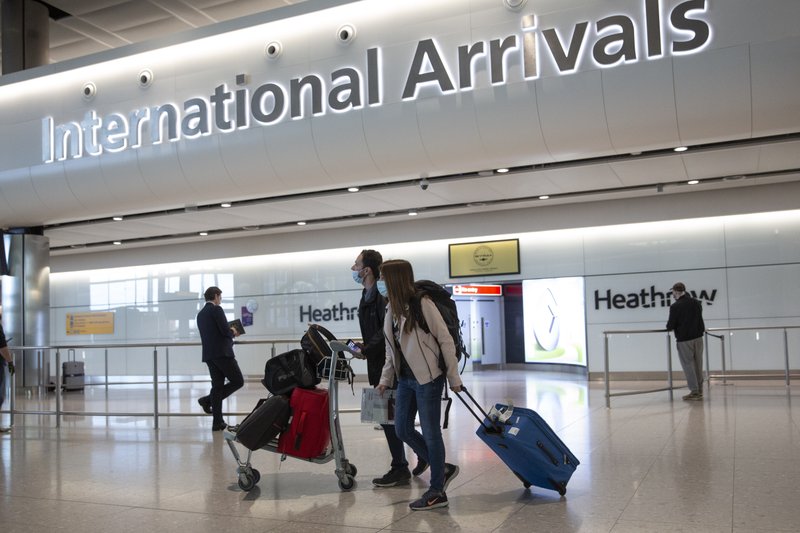Britain began imposing a 14-day quarantine Monday on travelers coming into the country, months after other European countries imposed similar measures to control the spread of the coronavirus.
The quarantine was roundly criticized by the aviation and tourism industries, with many questioning its timing. Critics say its introduction has come too late to be useful, and some doubted it could be effectively enforced.
Ryanair chief executive Michael O’Leary called the quarantine a “political stunt” and argued that it will cause “untold devastation” for the country’s tourism industry, not just for the airlines.
“The thousands of hotels, the thousands of visitor attractions, restaurants in the next couple of months — July and August are the two key months for British tourism,” he added. “We’re facing thousands of jobs losses because of a stupid, ineffective quarantine.”
All passengers — bar a handful of exceptions like truckers or medical workers — will be asked to fill in a form detailing where they will self-isolate for two weeks and must give a phone number so authorities can check up on them. The requirement applies regardless whether they are U.K. citizens or not, and those who fail to comply could be fined.
The quarantine was imposed after a heated debate on whether it would help British efforts to tamp down the U.K. outbreak or simply stamp out any hopes that the British tourism industry will recover following months of lockdown.
Venki Ramakrishnan, president of the prestigious Royal Society, told the BBC the coronavirus transmission rate in the U.K. is still too high for the quarantine to work well.
“I would say that countries that have imposed quarantine did so either very early or after the case rate in the country had gone down quite a bit,” he said.
British Airways, EasyJet and Ryanair have written to the British government applying for a judicial review, arguing that the quarantine rules are disproportionate. Willie Walsh, the boss of IAG — the group that owns British Airways — has said that airlines were not consulted about the move.
Many other European countries are beginning to reopen their borders as their infection numbers come down.
Prime Minister Boris Johnson’s Conservative government has been widely criticized for its slow response to fighting the outbreak. Many in his government, including Johnson himself, came down with coronavirus.
Britain did not close its borders, screen international arrivals or impose testing and tracing measures for travelers during the worst of the coronavirus outbreak. The government had insisted until May that putting restrictions at the border wouldn’t have a significant impact on the spread of the virus in the U.K.
Figures on Monday showed that a further 55 people died after testing positive with the virus, the lowest daily rise in the number of coronavirus deaths in the country since late March. Britain’s total death toll stood at 40,597, the second-highest in the world after the United States.
Health Secretary Matt Hancock said that while the pandemic is “clearly not over,” all the data showed that the country is making good progress.
“Coronavirus is in retreat across the land. Our plan is working,” he said.
At London’s Stansted Airport on Monday, shopkeeper Netti Rexhmet, who arrived from the Netherlands, said the rule will prevent him from working for two weeks.
“We haven’t got any other options, it’s government law so I shall do it,” he said, but added: “For me, I wouldn’t want to do it. … I’ve got things to do.”
In other developments in Europe:
MOLDOVA SEES COVID-19 CASES SURGE: A former health minister says Moldova’s coronavirus pandemic is “out of control” as the number of new cases keeps rising. Statistics released Monday show that Moldova registered 1,149 new COVID-19 cases in the first week of June, the highest weekly figure since March 7, when the first case was registered. Former Health Minister Ala Nemerenco said on Facebook that “you don’t have to be an epidemiologist, a virologist, or even a doctor to understand that the situation has gotten out of control.” Moldova has registered 9,700 coronavirus cases and 346 deaths.
POLAND SHUTS 12 MINES AMID OUTBREAK: Polish authorities have ordered the closure of 12 coal mines for three weeks after hundreds of workers were infected with COVID-19. The measure announced Monday comes as coal mines in Poland’s southern mining region of Silesia have become virus hot spots. Deputy Prime Minister Jacek Sasin says miners will receive full pay during the closure. Some 5,000 of Poland’s 27,000 confirmed COVID-19 cases are coal miners.
MOSCOW ENDS TWO-MONTH LOCKDOWN: The Russian capital is ending a tight lockdown that has been in place for more than two months, citing a slowdown in the coronavirus outbreak. Moscow Mayor Sergei Sobyanin said starting Tuesday residents will no longer be required to obtain electronic passes for travel and can walk, use public transport and drive without restrictions. The number of daily infections in Moscow has dropped from a peak of 6,700 to about 2,000 recently. Meanwhile, Russian Prime Minister Mikhail Mishustin said Monday that traveling abroad for work, studying, receiving medical treatment or taking care of relatives will be allowed. It wasn’t immediately clear when the partial reopening of Russia’s borders would take effect.
CYPRUS POLICE MOVES AGAINST SCOFFLAW BAR: Cypriot officials are warning against undue complacency in enforcing social distancing rules after video emerged of an jam-packed open-air nightclub at a popular seaside resort. Cyprus police spokesman Christos Andreou told The Associated Press on Monday that the Ayia Napa nightclub’s owner faces a charge of flouting maximum capacity limits. Andreou said police are taking the owner to court because he was repeatedly warned over the weekend and will also seek a court order to temporarily shut down the club.
(AP)











